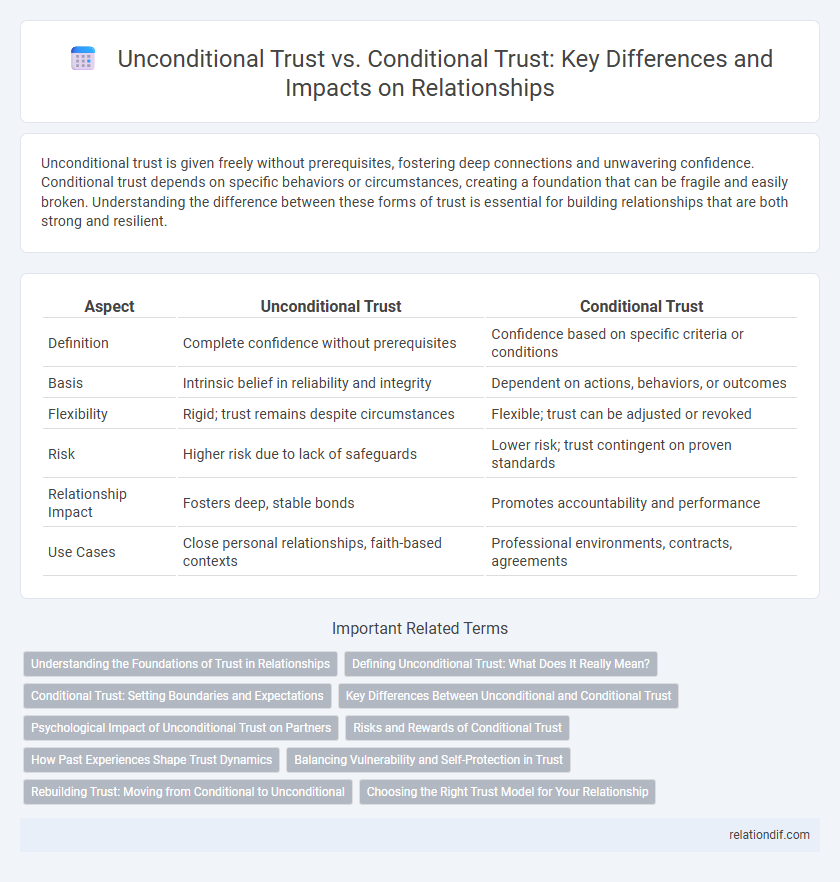Unconditional trust is given freely without prerequisites, fostering deep connections and unwavering confidence. Conditional trust depends on specific behaviors or circumstances, creating a foundation that can be fragile and easily broken. Understanding the difference between these forms of trust is essential for building relationships that are both strong and resilient.
Table of Comparison
| Aspect | Unconditional Trust | Conditional Trust |
|---|---|---|
| Definition | Complete confidence without prerequisites | Confidence based on specific criteria or conditions |
| Basis | Intrinsic belief in reliability and integrity | Dependent on actions, behaviors, or outcomes |
| Flexibility | Rigid; trust remains despite circumstances | Flexible; trust can be adjusted or revoked |
| Risk | Higher risk due to lack of safeguards | Lower risk; trust contingent on proven standards |
| Relationship Impact | Fosters deep, stable bonds | Promotes accountability and performance |
| Use Cases | Close personal relationships, faith-based contexts | Professional environments, contracts, agreements |
Understanding the Foundations of Trust in Relationships
Unconditional trust in relationships is rooted in deep emotional security and consistent positive experiences, allowing individuals to rely on each other without doubt or hesitation. Conditional trust depends on specific behaviors, past actions, or agreements, meaning it is granted only when certain criteria are met and can be withdrawn if expectations are not fulfilled. Understanding these foundations helps to navigate trust dynamics, fostering stronger, more resilient connections based on clarity and empathy.
Defining Unconditional Trust: What Does It Really Mean?
Unconditional trust means having complete confidence in someone or something without requiring specific conditions or guarantees. It involves accepting vulnerability and believing in the integrity and intentions of the trusted party regardless of circumstances. This form of trust is rare and foundational in deep personal relationships, often fostering stronger emotional bonds and resilience.
Conditional Trust: Setting Boundaries and Expectations
Conditional trust relies on clearly defined boundaries and expectations to foster a secure and accountable relationship. By establishing specific criteria for trustworthiness, individuals and organizations can protect themselves from potential breaches while encouraging responsible behavior. Setting these conditions helps maintain mutual respect and clarity, ensuring that trust is earned and sustained over time.
Key Differences Between Unconditional and Conditional Trust
Unconditional trust is characterized by unwavering confidence without prerequisites, relying on intrinsic belief in someone's reliability or integrity. In contrast, conditional trust depends on specific actions, behaviors, or circumstances being met before trust is extended or maintained. Key differences include the scope of acceptance--unconditional trust embraces flaws and uncertainties, while conditional trust requires proven consistency and often includes limitations or contingencies.
Psychological Impact of Unconditional Trust on Partners
Unconditional trust fosters emotional security and deepens intimacy between partners, reducing anxiety and promoting vulnerability without fear of judgment or betrayal. This psychological environment encourages open communication and resilience in relationship conflicts, strengthening the bond over time. Partners experiencing unconditional trust often exhibit higher relationship satisfaction and lower stress levels, contributing to overall mental well-being.
Risks and Rewards of Conditional Trust
Conditional trust carries the risk of creating instability in relationships, as trust depends on meeting specific criteria or behaviors, leading to potential disappointment if conditions are unmet. However, it rewards relationships with clear expectations and accountability, which can promote responsibility and prevent exploitation. Balancing these risks and rewards requires careful assessment of the conditions imposed and the flexibility to adapt when circumstances change.
How Past Experiences Shape Trust Dynamics
Past experiences profoundly influence trust dynamics by setting expectations for future interactions and determining whether trust is offered unconditionally or remains conditional. Unconditional trust often develops from positive, consistent past experiences that foster a sense of security and reliability without reservations. Conversely, conditional trust emerges when prior encounters involve breaches or uncertainties, leading individuals to establish clear boundaries and prerequisites before extending their trust.
Balancing Vulnerability and Self-Protection in Trust
Unconditional trust involves complete vulnerability without safeguards, creating deep connections but increasing risks of betrayal or harm. Conditional trust relies on assessing actions and setting boundaries, promoting self-protection while allowing relationship growth through earned reliability. Balancing vulnerability and self-protection requires recognizing when to open trust fully and when to maintain cautious scrutiny based on past experiences and situational awareness.
Rebuilding Trust: Moving from Conditional to Unconditional
Rebuilding trust requires consistent transparency, accountability, and empathetic communication to transition from conditional to unconditional trust. Establishing clear boundaries and demonstrating reliability over time fosters a secure environment where trust can deepen beyond specific conditions. Prioritizing emotional safety and mutual respect is essential to cultivating lasting, unconditional trust in relationships.
Choosing the Right Trust Model for Your Relationship
Choosing the right trust model for your relationship depends on the nature and goals of the connection, where unconditional trust fosters deep emotional bonds without prerequisites, while conditional trust hinges on specific behaviors and proven reliability. Unconditional trust often thrives in long-term, intimate relationships due to its emphasis on acceptance and vulnerability, whereas conditional trust suits professional or transactional relationships that require clear boundaries and accountability. Understanding these distinctions enables individuals to cultivate trust that aligns with their relationship dynamics, promoting stronger and more sustainable interactions.
Unconditional Trust vs Conditional Trust Infographic

 relationdif.com
relationdif.com